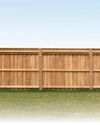Whether you’re installing ceramic tile, laminate planks or carpet, self-leveling underlayment is a great choice for floors that are rough, uneven or out of level. And it’s the absolute best choice for tile installations over an in-floor heating system.

Self-leveling underlayment is easy to work with and doesn’t require a lot of fancy tools or years of training. However, there is a fair amount of prep work that needs to be done—and done right, because once the pouring starts, you’ll need to work fast. We’ll show you the step-by-step process to achieve a perfectly flat and level underlayment that’s smooth as glass.
Seal every hole and crack
Thoroughly sweep and vacuum the entire floor, and then seal all holes and seams in the plywood with caulking. The self-leveler will drain through an opening as small as a nail hole, so be thorough. Get the type of caulk that goes on white but turns clear when it dries so you can tell when it’s done setting up.
Taping over the caulk with packing tape isn’t required, but it’s a terrific way to avoid stepping in a glob and tracking it around the rest of the house. When working on an older house with floor planks instead of plywood, cover the whole floor with self adhering roofing underlayment.
Build dams around big openings
Isolate large holes like heating vents and floor drains with cardboard. Just shape the cardboard to the hole and tape it in place. Caulk the cardboard to the floor.
Make the walls leak proof
Sill sealer (a foam gasket that carpenters use to seal between the foundation and the bottom wall plates) makes a great barrier to keep the self-leveler from escaping into other rooms or into the basement. Hold it in place with staples from a staple gun. Keep the staples low enough so the staple holes will be hidden by the base trim. Sill sealer that’s either 3-1/2 in. or 5-1/2 in. wide will work, but the wider sealer does a better job of protecting painted walls from splashes.
This story is from the {{IssueName}} edition of {{MagazineName}}.
Start your 7-day Magzter GOLD free trial to access thousands of curated premium stories, and 9,000+ magazines and newspapers.
Already a subscriber ? Sign In
This story is from the {{IssueName}} edition of {{MagazineName}}.
Start your 7-day Magzter GOLD free trial to access thousands of curated premium stories, and 9,000+ magazines and newspapers.
Already a subscriber? Sign In

7 Bicycle Maintenance Tips
Keep your bike in tiptop shape and ride safe!

SETTING FENCE POSTS WITH EXPANDING FOAM
Any fence builder knows you need strong posts for a strong fence, and that means backfilling the postholes with a dense, hard material other than dirt.

PEBBLE MOSAIC STEPPING STONES
COLLECT SOME RIVER ROCK AND MAKE YOUR OWN UNIQUE STEPPINGSTONE PATH

EARTH-FRIENDLY WEED KILLERS
HEALTHIER CHOICES FOR HUMANS AND THE ENVIRONMENT

DIY! HYDROPONIC GARDEN
FRESH VEGETABLES AT YOUR FINGERTIPS

GROW MINI VEGETABLES
GROW A GARDEN IN A TINY SPACE!

BUILD A VERTICAL GARDEN
TIME TO GROW UP!

MODERN WATER FOUNTAINS
A SPLASH OF PEACE FOR YOUR PATIO

9 ALTERNATIVE USES FOR SAWDUST
Every fully stocked wood shop has a table saw. You can usually find a pile of sawdust under it, even if it's used only occasionally. If a shop has a belt sander or band saw, there's probably another pile of finer sawdust under that. Even people without stationary tools have sawdust accumulation on their workbenches.

INSULATE WITH FOAM
IT'S A GREAT ALTERNATIVE TO FIBERGLASS